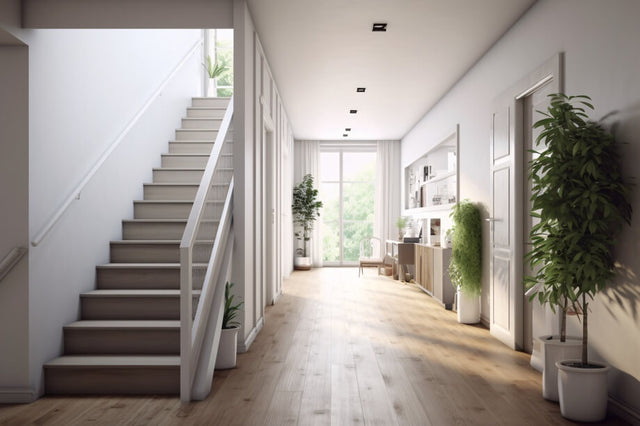Tiles for stairs: safe and elegant solutions
Stairs in a house or apartment serve not only a practical function but also an aesthetic one. The choice of the right tiles for the finish can significantly impact the safety of the residents and the overall appearance of the interiors. Stair tiles must not only be stylish but, above all, resistant to abrasion and slipping. In the world of interior design, there are many options that combine these two characteristics, creating the perfect solution for any type of staircase. In this article, we will examine the different types of tiles available on the market that will work well on stairs, both in terms of functionality and aesthetics.
Safety first: which tiles to choose to make them non-slip?
The safety of stairs is a priority, especially in high-traffic areas or homes with small children. Choosing the right tiles can significantly reduce the risk of slipping. A fundamental aspect is understanding the R classification, which determines the slip resistance of the tiles. Anti-slip tiles are classified according to this scale, where R9 means minimum resistance and R13 means maximum resistance. In typical indoor settings, class R9 or R10 is usually sufficient. However, outdoors, where there is a risk of getting wet, it is worth choosing tiles of class R11 or higher.
The surface structure of the tile also plays an important role. Tiles with a rough and irregular surface naturally increase adhesion. Models with a structure that mimics stone or wood are particularly recommended. If we do not want to replace the existing tiles, an alternative can be to use special non-slip mats that will provide additional protection. It is also worth remembering regular maintenance. Even the best tiles can lose their non-slip properties if not cleaned properly. Polishing agents can make the surface slippery, so they should be avoided.
Types of tiles for stairs: an overview of available materials
When choosing tiles for stairs, it is worth paying attention not only to their appearance but especially to safety. Proper structure, processing, and maintenance can significantly affect the comfort and safety of using the stairs.
Ceramics
The ceramic tiles are one of the most popular choices for stairs. They are durable, easy to clean, and available in a wide range of designs and colors. Their surface can be smooth or rough, which affects their slip-resistant properties. Raw ceramic tiles are safer for stairs, especially in areas exposed to moisture.
Porcelain
The porcelain stoneware is very similar to ceramic, but it is more resistant to abrasion and water absorption. This makes them ideal for outdoor stairs. They can imitate various materials, such as stone or wood, combining aesthetics with functionality.
Natural stone
Marmore, granite, and slate are luxury choices for stairs. Each stone has a unique pattern and color, adding elegance to any interior. However, stone can be slippery, especially when wet, so it is worth considering an appropriate surface treatment.
Firewood
The wooden tiles add warmth and natural charm to the stairs. Although the wood itself can be slippery, there are coatings and special treatments that enhance its anti-slip properties.
Terracotta
is a type of fired ceramic tile that features a characteristic red color. They are porous and can be slippery when wet, but their rustic appearance makes them an attractive choice for many interiors.
Mosaic
Small tiles, often made from various materials such as glass, stone, or ceramic, create patterns and images. Mosaics can be beautiful and functional if the right texture is chosen.
Concrete
The contemporary interiors often use concrete stairs. The concrete can be colored, painted, or mixed with various additives to achieve the desired appearance. Its surface can be smooth or rough depending on your needs.
Tiles for outdoor stairs: what should you pay attention to when choosing tiles for the area surrounding your home?
When choosing tiles for outdoor stairs, one faces the challenge of combining aesthetics and functionality. It is essential to ensure that the selected tiles are resistant to changing weather conditions, such as frost, rain, or intense UV radiation. Materials like porcelain or natural stone work perfectly in harsh conditions and ensure long-lasting durability for years.
Safety is another priority. Outdoor stairs are often exposed to moisture, so it is important that the tiles have non-slip properties. The rough surface of the tiles can significantly increase grip, minimizing the risk of slipping. Aesthetics and style also play an important role. The tiles should blend harmoniously with the surrounding environment of the house and garden. Whether it is modern concrete, classic terracotta, or elegant granite, the choice reflects the character and soul of the space.








0 Comments
There are no comments for this article. Be the first one to leave a message!